British ports are calling on the government to compensate for millions in wasted spending on post-Brexit border infrastructure that is now set to be rendered redundant under the UK’s new trade deal with the European Union.
The agreement, which includes a commitment to drop most sanitary and phytosanitary (SPS) checks on food, animal products and agricultural goods, has been broadly welcomed by port authorities. However, the deal has also sparked anger over the millions invested in facilities that may now never be used.
According to the British Ports Association (BPA), ports spent more than £120 million preparing for a regime of rigorous post-Brexit border inspections — spending that now appears unlikely to be recouped.
“While a new framework agreement is welcome, it means capital and operational costs, as well as opportunity costs, will likely never be recovered from traders as promised,” said Richard Ballantyne, BPA chief executive. “We are therefore calling on the government to meet the shortfall.”
The BPA represents ports responsible for 86% of UK trade, including most handling EU goods. While some larger ports already had the required inspection infrastructure, many smaller and regional ports were forced to build new facilities from scratch.
One of the most affected is Portsmouth International Port, which is owned by Portsmouth City Council. The port spent £6 million of its own funds — in addition to £17 million in government grants — to build a highly specialised border control post (BCP), which now stands mostly unused.
“This specialist facility cost over £23 million and takes up two acres of valuable operational land,” said Steve Pitt, leader of Portsmouth City Council. “If there’s no longer a need for inspections, we may be forced to consider demolishing a building that’s less than three years old.”
The port had originally expected to recoup costs through inspection charges levied on traders, but with SPS checks now removed, those revenue streams have vanished.
The ports’ expenditure came on top of the £200 million Port Infrastructure Fund provided by the UK government to help prepare for post-Brexit trade requirements.
But according to the National Audit Office, this is only a fraction of the broader public spending. Its 2023 report revealed that £4.7 billion has been spent by the government on implementing post-Brexit border systems — even though full controls on EU imports have been delayed five times since January 2021.
This prolonged uncertainty left many port operators unable to plan or budget effectively, ultimately investing in facilities under pressure from Westminster that now risk becoming white elephants.
The rollback of SPS checks is part of a broader effort to reduce post-Brexit trade friction between the UK and the EU. The change is expected to ease supply chain bottlenecks, reduce import costs for businesses, and simplify logistics for perishable goods. But for many ports, the question now is who foots the bill for a regulatory environment that never fully materialised.
Port authorities and local councils are urging the government to launch a formal compensation process and provide clarity on the future of border infrastructure, especially for smaller ports that sacrificed commercial land to comply with previous regulatory guidance.
Whether the Treasury will act on the calls remains unclear. But as the UK’s post-Brexit strategy continues to evolve, the financial legacy of its early implementation missteps is still being counted — and contested.
Read more:
UK ports demand compensation after Brexit border checks scrapped under new EU deal


























